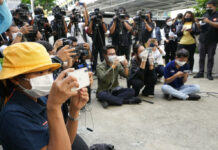
BANGKOK (AP) — Thailand’s government backed down Tuesday from widely-criticized regulations to broaden its ability to restrict media reports and social media posts about the coronavirus pandemic.
Prime Minister Prayuth Chan-ocha had long sought to crack down on what he deems fake news. But the new regulations, enacted at the end of last month, included the ability to prosecute people for distributing “news that may cause public fear.”
They also gave Thai regulators the ability to force internet service providers to turn over the IP address of the person or entity distributing such news, and to “suspend the internet service to that IP address immediately.”
Thailand is struggling with its worst wave yet of the coronavirus pandemic, and Prayuth said the new regulations were necessary to combat the spread of inaccurate rumors that could impede government efforts to vaccinate the population and implement measures to slow the pandemic.
But Thai media organizations said the restrictions were overly broad and an attack on freedom of expression, giving authorities license to crack down on the public or news organizations for publishing factual reports that the government didn’t like.
A group of media organizations appealed the measures, and last week a court issued a temporary injunction against the enforcement of the regulations until the case could be heard.
Due to the pandemic, however, it was not clear when it would be able to hear the case and Prayuth decided instead to revoke it, according to the official announcement published in the Royal Thai Government Gazette.
Before the Gazette was published Tuesday, Thai opposition parties submitted a complaint to the National Anti-Corruption Commission accusing Prayuth of abusing his power by violating constitutional guarantees of freedom of speech with the new regulations.
If the commission were to question Prayuth and find him guilty, it would then send the case to the country’s supreme court, which could, in turn, suspend Prayuth from office as the case is heard.
With his decision to revoke the regulations, however, it was not clear whether the anti-corruption commission would take up the complaint.
___
Story: David Rising. Associated Press writer Chalida Ekvittayavechnukul contributed to this report.















































